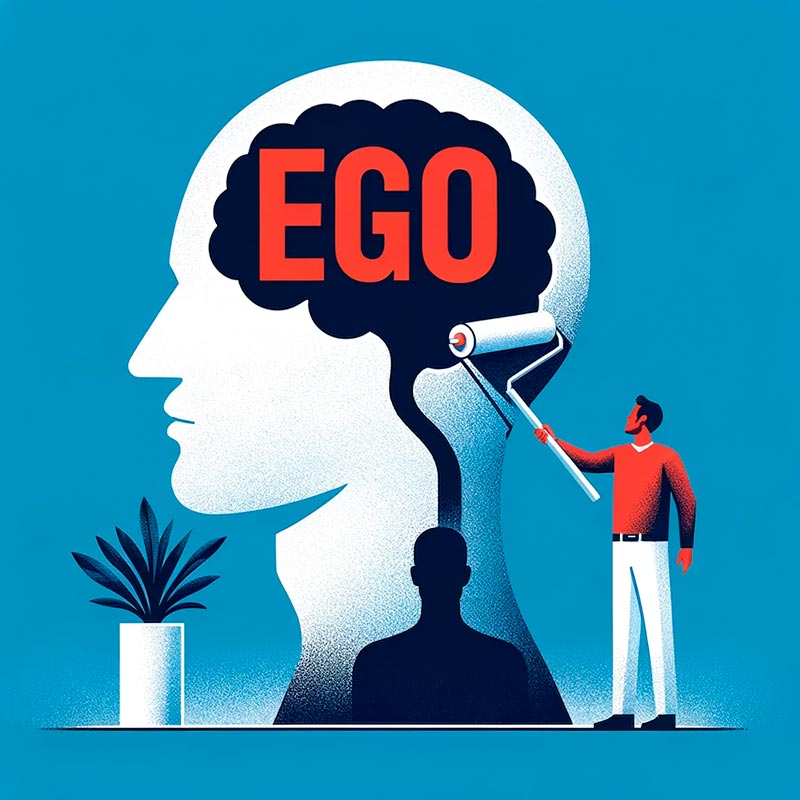In the intricate tapestry of Bahá’í teachings, the dialectic between ego, spiritual power, and the purity of intention emerges as an evocative exploration of the human condition. This relationship, deeply embedded in the spiritual paradigm of the Bahá’í Faith, serves not only as a reflection of individual character but also as a conduit through which divine attributes may manifest within the earthly realm.
To delve into this theme is to embark on an expedition across the multifaceted terrains of selfhood. The concept of ego, often cloaked in negative connotations, can be reconceptualized through a Bahá’í lens as both a necessary element of identity and a potential misguidance. Ego can be likened to a double-edged sword; on one side, it fortifies a sense of self, a requisite for navigating the complexities of existence, while on the other, it risks metamorphosing into self-absorption, clouding the individual’s capacity to connect with the divine and others. The Bahá’í teachings illuminate how the ego, when nurtured through selfless service and love, transforms from a mere façade into a spiritual ally.
The Rajab metaphor offers profound insight into this transformative journey. Picture a clear pool of water, where each ripple signifies an action or intention. When the pool is untainted by debris—the ego transformed through humility and purpose—the reflections of the heavens upon its surface can be seen in their entirety. Conversely, when the surface is disturbed, marred by self-centered motivations, the celestial images fragment, obscuring the deeper truths. Thus, the Bahá’í teachings underscore that a purified intention amplifies the resonance of our actions, steering us toward the fulfillment of divine purpose.
At the heart of this dialogue lies the notion of spiritual power—an ethereal force that emerges when the ego is denuded of its excessive tendencies. This power is not akin to worldly authority; rather, it emanates from alignment with divine will, allowing individuals to transcend self-imposed limitations. The Bahá’í writings articulate that true strength is cultivated through humility, compassion, and the fervent desire to serve humanity. One could argue that spiritual power is akin to an underground river, continuously flowing regardless of external impediments, nurturing the soil of the soul, fostering growth that may later blossom into acts of profound significance.
The question, then, remains: how can one cultivate this spiritual power while maintaining a clear conscience? The exploration of purity of intention becomes paramount. An individual striving to transcend ego must constantly engage in introspection, an exercise in spiritual vigilance. By scrutinizing the motives driving their actions—be they altruistic or self-serving—they embark on a path toward self-rectification. The Bahá’í principle of unity emphasizes that an intention rooted in collective welfare enhances the vibrational frequency of one’s existence. It transforms mundane acts into extraordinary moments of grace, invoking a ripple effect that perpetuates societal upliftment.
Mahatma Gandhi’s concept of “satyagraha,” or truth-force, encapsulates this idea succinctly. His advocacy for justice was always infused with a profound respect for all beings, illustrating that the strength of one’s intentions can be a catalyst for monumental change. Through this prism, we gain insight into the Bahá’í assertion that purity of intention is inexorably linked to the proactive cultivation of virtues such as kindness, patience, and forgiveness. Each of these qualities acts as a beacon, illuminating the path to genuine transformation—both within oneself and within the broader fabric of humanity.
In practice, the cultivation of such virtues requires an unwavering commitment to self-improvement and a conscious effort to navigate the complexities of interpersonal relationships. It necessitates an understanding that the divine attributes do not exist in isolation but rather harmoniously within the expansive network of humanity. By acknowledging our shared vulnerabilities and recognizing the inherent dignity in others, we exercise our spiritual powers through empathy—transmuting the ego into a vehicle for divine expression.
Furthermore, the conversation surrounding ego, spiritual power, and pure intentions can be enriched through the lens of the Bahá’í principle of life after death. The belief in an eternal soul introduces another temporal layer, reminding believers that earthly interactions hold everlasting consequences. The implications of this belief can motivate individuals to attune their actions and intentions with a sense of greater responsibility. As one prepares to embark on the next stage of existence, every interaction becomes imbued with significance, shaping one’s spiritual legacy through the purity with which one engages with others.
To encapsulate the duality of ego as both a facilitator and an obstacle is to realize that the path of self-discovery is neither linear nor isolated. The Bahá’í teachings resonate with the assertion that the nurturing of spiritual power relies heavily on the cultivation of robust moral fibers in the fabric of community living. As the self learns to dissolve within the greater whole, it is through this union that individuals find their most authentic selves—tethered by an unwavering intention to serve humanity.
In conclusion, the interplay of ego, spiritual power, and the purity of intention within the Bahá’í framework emerges as a clarion call to introspection and humility. As adherents strive to transmute their ego-driven impulses into a force for collective empowerment, they discover that the essence of true power lies not in dominance, but in the quiet influence of benevolence and a steadfast commitment to fostering unity. Through this journey, the ripple effect of purity in intention not only nourishes the individual soul but enhances the spiritual tapestry of society itself—a testament to the transcendent nature of the Bahá’í Faith.
